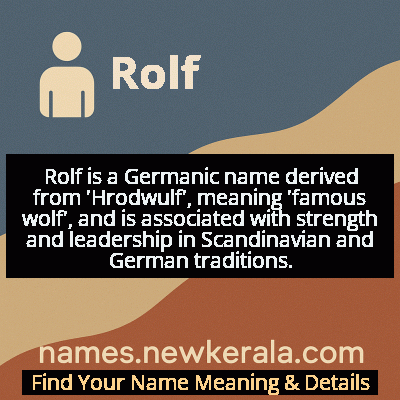Rolf Name Meaning & Details
Origin, Popularity, Numerology Analysis & Name Meaning of Rolf
Discover the origin, meaning, and cultural significance of the name ROLF. Delve into its historical roots and explore the lasting impact it has had on communities and traditions.
Name
Rolf
Gender
Male
Origin
Christian
Lucky Number
6
Meaning of the Name - Rolf
Rolf is a Germanic name derived from 'Hrodwulf', meaning 'famous wolf', and is associated with strength and leadership in Scandinavian and German traditions.
Rolf - Complete Numerology Analysis
Your Numerology Number
Based on Pythagorean Numerology System
Ruling Planet
Venus
Positive Nature
Harmonious, responsible, caring, and artistic.
Negative Traits
Overly idealistic, superficial, possessive, or jealous.
Lucky Colours
Pink, turquoise.
Lucky Days
Friday.
Lucky Stones
Diamond, turquoise.
Harmony Numbers
2, 3, 9.
Best Suited Professions
Artists, musicians, teachers, healthcare workers.
What People Like About You
Warmth, nurturing nature, artistic flair.
Famous People Named Rolf
Rolf Harris
Entertainer and Artist
Australian-British entertainer known for his musical talents and television presenting
Rolf Lassgård
Actor
Swedish actor famous for his role in the original film adaptation of 'A Man Called Ove'
Rolf de Heer
Film Director
Dutch-Australian film director known for 'The Tracker' and 'Ten Canoes'
Rolf Zuckowski
Musician and Composer
German musician famous for children's songs and Christmas music
Name Variations & International Equivalents
Click on blue names to explore their detailed meanings. Gray names with will be available soon.
Cultural & Historical Significance
In Christian contexts, while the name maintained its pagan origins, it became associated with various saints and religious figures throughout medieval Europe. The name's popularity spread across Scandinavia, Germany, and eventually to England through Norman influence. During the Middle Ages, Rolf represented the ideal of the noble warrior—strong yet intelligent, fierce yet loyal. The name's endurance through centuries of cultural change demonstrates its adaptability and lasting appeal, making it a bridge between ancient warrior traditions and modern European identity.
Extended Personality Analysis
Individuals named Rolf typically exhibit a unique blend of strength and sensitivity that makes them both formidable and approachable. They often possess natural leadership qualities combined with a deep sense of loyalty to their family and community. Rolfs are known for their practical intelligence and problem-solving abilities, approaching challenges with both analytical thinking and creative solutions. Their wolf namesake manifests in their protective nature toward loved ones and their ability to work effectively in teams while maintaining their independence.
Many Rolfs demonstrate artistic talents or appreciation for the arts, often expressing themselves through music, writing, or visual media. They tend to be perceptive observers of human nature, with an intuitive understanding of social dynamics. While they can appear reserved initially, once trust is established, they form deep, lasting relationships. Their combination of strategic thinking and emotional intelligence makes them excellent in careers requiring both technical skill and interpersonal understanding. Rolfs often value tradition and history while being open to innovation and progress.
Modern Usage & Popularity
In contemporary naming trends, Rolf maintains a steady but modest presence, primarily in German-speaking countries and Scandinavia where its cultural roots are strongest. The name experienced its peak popularity in the mid-20th century but has since become less common, making it a distinctive choice for modern parents seeking a traditional name with character. In Germany, Rolf currently ranks around 450th in popularity, while in Sweden and Norway it appears occasionally but not among the top names. In English-speaking countries, Rolf remains quite rare, often chosen by families with Scandinavian or German heritage. The name's decline in recent decades has made it a vintage choice that stands out without being overly unusual. Modern parents selecting Rolf often appreciate its strong historical connections, easy international pronunciation, and the growing trend toward reviving classic names with meaningful origins.
Symbolic & Spiritual Meanings
The symbolic meaning of Rolf extends far beyond its literal translation of 'famous wolf' or 'red wolf.' The wolf symbolism represents intelligence, strong family bonds, freedom, and survival instincts—qualities highly valued in both ancient and modern contexts. In Norse mythology, wolves were respected as powerful companions and formidable opponents, with Odin keeping wolves as sacred animals. The 'red' element adds layers of meaning connected to vitality, passion, courage, and the life force itself. Symbolically, Rolf embodies the balance between wild independence and loyal companionship, between strategic intelligence and instinctual action. The name suggests a person who can navigate both social structures and individual challenges with equal skill. This rich symbolic tapestry makes Rolf a name that conveys strength, wisdom, protection, and the ability to thrive in various environments while maintaining one's core identity and values.

